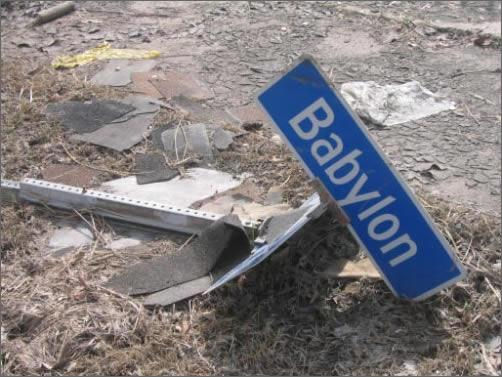
Thaddeus Bruno
Jun 1, 2013
Psalm 127:1 KJV
Though the ancient city of Babylon was considered a model of impregnable fortification, today its twenty one hundred acres of ruin testify to the truth uttered by the psalmist in the long ago. “...Except the Lord keeps the city, the watchman waketh but in vain” (Psalm 127: 1). The truthfulness of that statement has been generally missed by religious leaders, social activists and political rulers. Thus it needs to be restated and re emphasized. For homes, churches, cities or nations to endure, they need the sanction of God.
When the prophet Isaiah forecasted the destruction of the city of Babylon, and further predicted that it would never be inhabited again (Isaiah 13), his words must have seemed like the ranting of a madman. The city was surrounded by a sixty feet high inner wall, whose thickness would allow for at least four chariots to ride abreast on the top of it. At least one hundred watchtowers at sixty feet intervals, punctuated its forty two mile circumference, providing advantageous lookouts in every direction possible. Beyond this wall was an outer wall at least twelve feet thick, and a water trench fed by the Euphrates river as a first line of defense, surrounding the city. No one, however who was familiar with God’s predictions of judgment against Babylon, uttered through His prophets, felt comfortable within the city.
Daniel was one such prophet. His interpretation of the towering image of Nebuchadnezzar’s dream, meant doom to the city. Daniel explained that four empires were symbolized by the gold, silver, brass and the iron and clay, and that these were to supersede each other (Daniel 2: 36-45). Since Nebuchadnezzar and his kingdom were represented by the golden head of the image, this meant that his kingdom would be over-run by the Medes and the Persians, who were symbolized by the image’s chest and arms of silver. Isaiah also, in less figurative language had predicted the same destruction. “Behold I will stir up the Medes against them....And Babylon, the glory of kingdoms, the beauty of the Chaldees’ excellency, shall be as when God overthrew Sodom and Gomorrah” (Isaiah 13: 17-19). Jeremiah, likewise cried out against Babylon. After predicting that Judah would be seventy years in exile, he had this to say. “And it shall come to pass, when seventy years are accomplished, that I will punish the kingdom of Babylon and that nation says the Lord, for their iniquity, and will make it perpetual desolations” (Jeremiah 25: 12). Daniel lived to witness and records the fulfillment of those prophecies.
He tells of the bone-chilling appearance of a hand, writing on the wall of the royal ballroom, where Belshazzar, Nebuchadnezzar’s grandson was having a sacrilegious party. The writing declared that Belshazzar had been weighed in the balances and found too light, and that his kingdom had been divided and given to the Medes and Persians. That very night Darius dried up the moat defenses by diverting the Euphrates river. His troops marched up the dried river bed and so took the city, not because of military might but because Babylon did not have the sanction of God. The Lord was not keeping watch over the city.
The ancient city of Babylon has become the epitome of confusion of which the apostle Paul tells us God is not the author ( I Cor 14: 33). It is the symbol of oppression. The psalmist wrote, “By the rivers of Babylon, where we sat down and where we wept when we remembered Zion” (Psalm 137: 1). It is synonymous with human measures of security which at best are vulnerable. Our security is not in economic strength or military might but in God. Babylon represents opposition to God. It was there that Daniel was thrown into a den of lions, and the three Hebrew boys were thrown into a furnace of fire because they insisted on a monotheistic approach to religion. It symbolized pride and arrogance, concerning which Peter wrote, “God resisteth the proud and giveth grace to the humble” (I Pet 5: 5, 6).
The fall of Babylon is a historical certainty that every system, whether religious, social or political, that embodies these vices, no matter how seemingly protected and fortified, is destined to destruction. The words of the angel to John in the apocalypse are both fatal and applicable. “Babylon the great is fallen, is fallen...” and again “...come out of her my people that ye be not partakers of her sins “(Revelation 18: 1-4).
